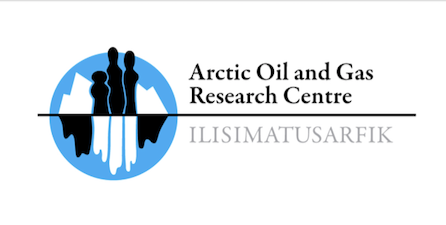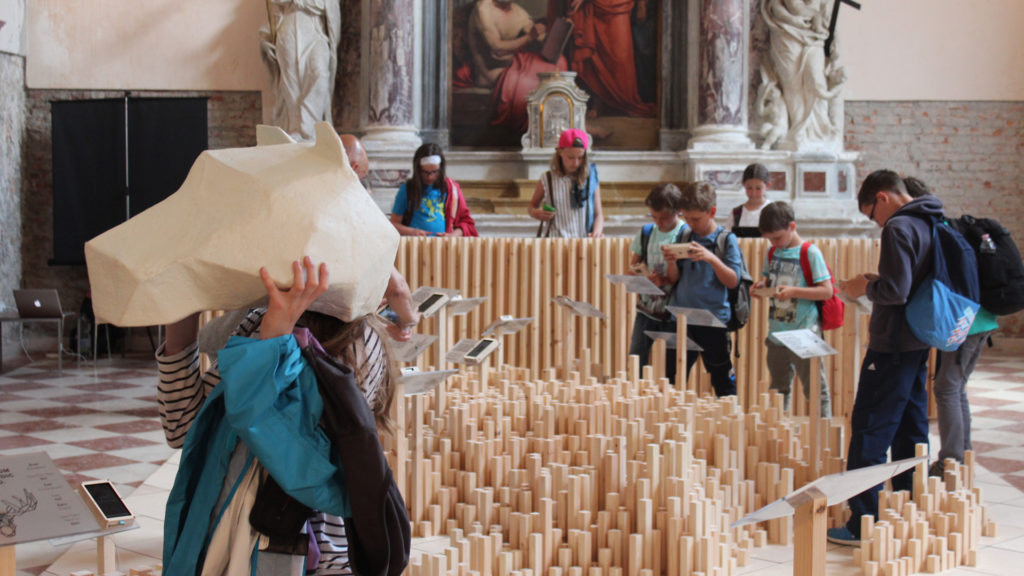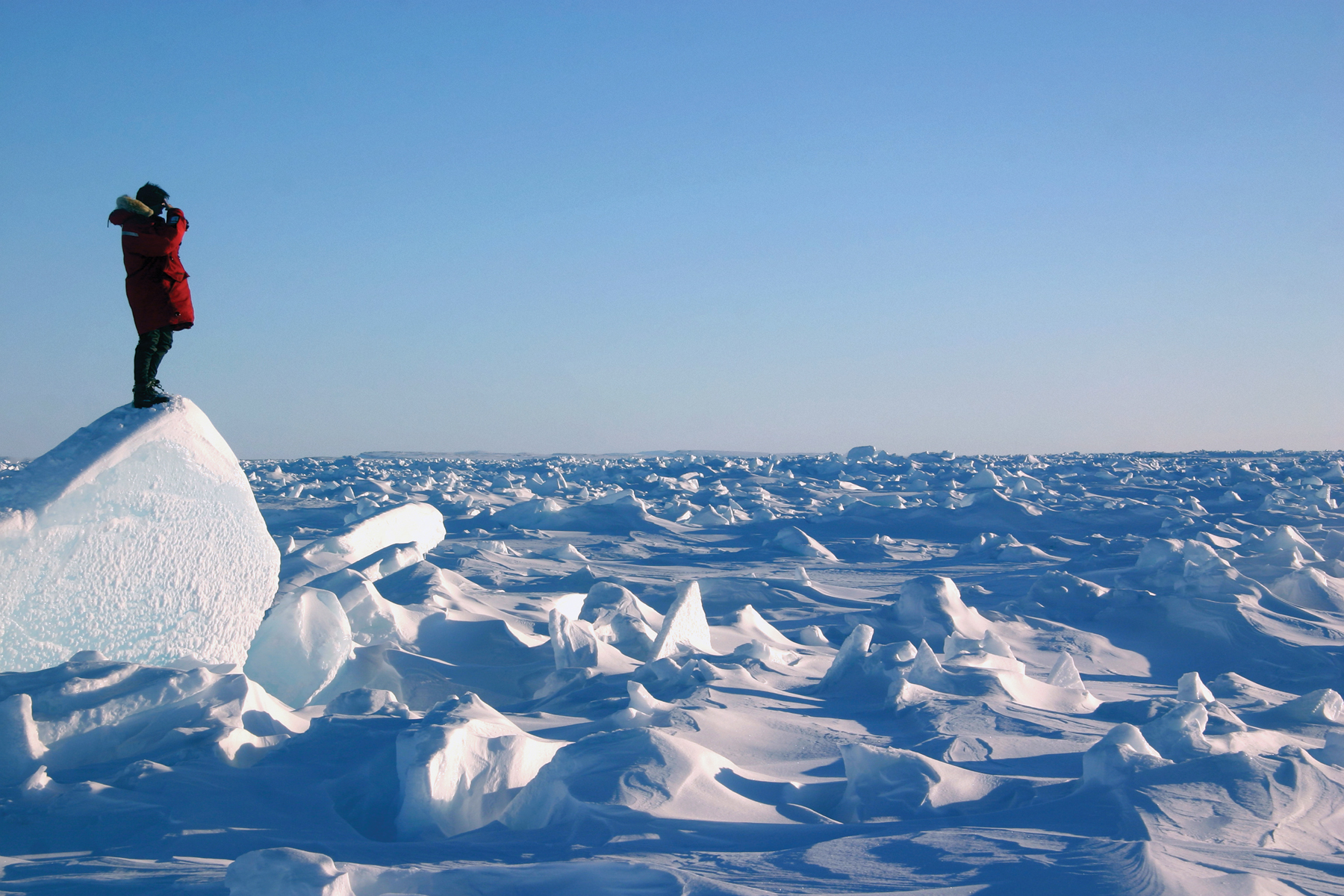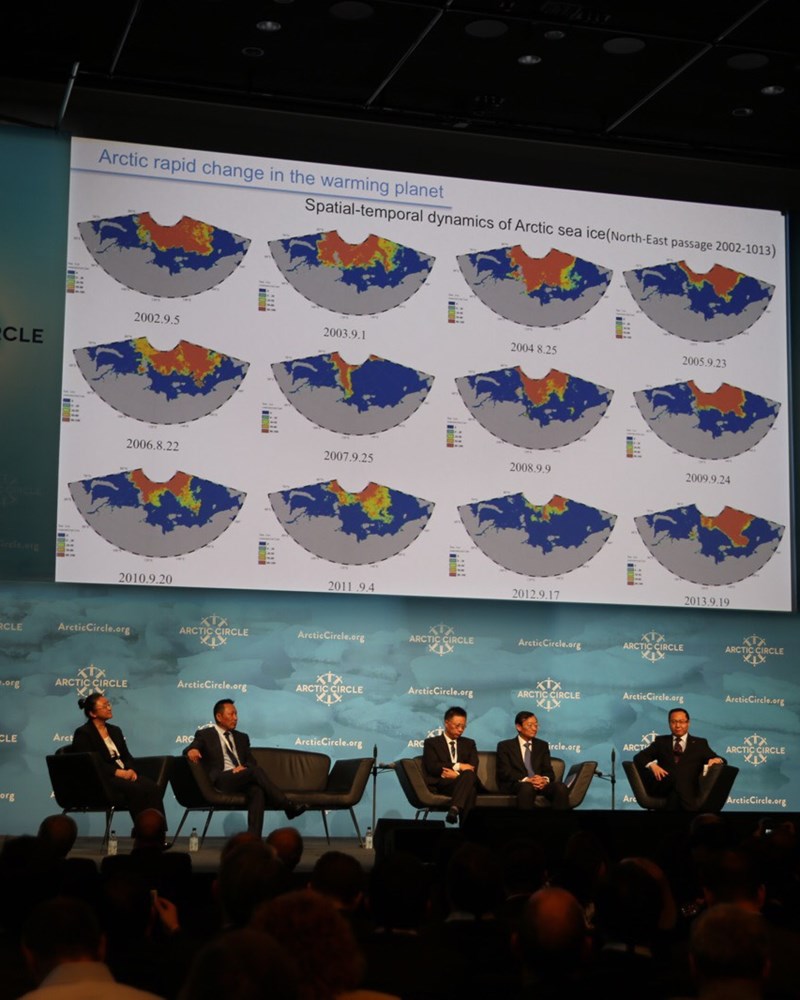2016 Breakout Sessions
Friday, October 7th, 15:30–17:00
Breakout Sessions are organized by the respective partners of the Arctic Circle, organizations, institutions, companies, think tanks, universities, or other bodies.
French Research and the Arctic: Towards a Sustainable Arctic
Organized by the Ministry of Foreign Affairs and International Development of France (27. September 2016)
Speakers
- Johan Etourneau, Scientific Officer, French National Center for Scientific Research (CNRS)
- Kathy Law, Research Director, CNRS/LATMOS
- Jean-Dominique Wahiche, Professor, Musée National d’Histoire Naturelle, France
Moderator
- Laurent Mayet, Special Representative of France for Polar Affairs
BRICs in the Arctic: Emerging Opportunities for Collaborative Initiatives
Organized by Saint Petersburg State University, Russia (19. September 2016)
Speakers
- Sergio C. Trindade, President, SE2T International, Ltd. Celma Regina Hellebust, lawyer, Honorary Vice-Consul for Brazil in Stavanger
- Carolina A. Freire, Professor of Animal Physiology, Federal University of Paraná, Brazil
- Alexander Sergunin, Professor of International Relations, St. Petersburg State University, Russia
- Valery Konyshev, Professor, School of International Relations, St. Petersburg State University
- Maria L. Lagutina, Associate Professor, Vice-head of World Politics Department, Saint Petersburg State University
Speakers (remote)
- Zhang Yao, Senior Fellow, Shanghai Institute for International Studies (SIIS)
- R. K. Pachauri, former head of the Intergovernmental Panel on Climate Change (IPCC)
Social Impacts of Oil and Gas Activities in the Arctic – Challenges and Benefits
Organized by the Arctic Oil and Gas Research Centre, Ilisimatusarfik (University of Greenland) (6. September 2016)
Friday, October 7, 15:30-17:00
Location: Esja, Harpa Fifth Level
The development of Arctic oil is often considered controversial in terms of impacts on the surrounding environments and nearby communities. This session will focus on lessons learnt from offshore oil and gas exploration, extraction and development in Arctic countries.
The panel will present recent findings from Arctic case studies on global, regional and local impacts of extractive policies as well as challenges and benefits experienced by practitioners in the field.
Speakers
- Rachael Lorna Johnstone, Professor of Law, University of Akureyri: Introduction: Social Impacts of Oil and Gas Activities in the Arctic – Challenges and Benefits.
- Anne Merrild Hansen, Professor at Ilisimatusarfik, University of Greenland: Social Impact Assessment in Oil and Gas Development: Community Experiences from Greenland and Alaska.
- Anita L. Parlow, Fulbright-MFA Arctic Scholar at the University of Akureyri and National Energy Authority: Toward an Arctic Standard in the New North: Projected Considerations by Iceland and Norway in the Jan Mayen Offshore.

Speakers (cont'd)
- Brigt Dale, Senior Researcher, Nordland Research Institute, Norway: The Post-Petroleum Perspective: Is There Security to be Found Beyond the Oil Ontology?
- Natalya Novikova, Researcher, Institute of Ethnology and Anthropology, Russian Academy of Sciences: Anthropological expert review in Russia: Goals of researchers and expectations of indigenous peoples.
- Emma Wilson, Associate, Scott Polar Research Institute, Cambridge University: Ethics and practice: implementing international social performance standards in Arctic extractive industry contexts.

Prospect North: How Can Design and Technology Transform Community Engagement Across the High North?
Organized by the Scottish Government, Lateral North and Soluis Group (2. September 2016)
Friday, October 7, 15:30-17:00
Location: Ríma A, Harpa First Level
Join design collectives Lateral North and Soluis as they present Prospect North, an exhibition which draws on Scotland’s relationship to the north to explore issues common to communities across the Arctic.
Using a large-scale physical and digital model, the exhibition allows people to travel to Scotland through augmented and virtual reality to experience how peripheral communities have responded to various challenges and opportunities. This will lead to a conversation among participants about how holistic planning, design and technology can play a role in shaping the future of resilient communities across the Arctic and beyond. This session will be chaired by the Scottish Government’s Chief Architect. It will include presentations and a workshop mapping out where similar scenarios are found within ‘your Arctic’ and how communities can respond to them.
 Virtual reality, transporting you to Scotland, is encased within Polar Bear masks, a reflection of Scotland and the Arctic.
Virtual reality, transporting you to Scotland, is encased within Polar Bear masks, a reflection of Scotland and the Arctic.
Participants will be invited to take part in an interactive workshop to identify potential challenges, opportunities and outcomes from throughout the Arctic region with a specific focus on separating the Arctic into four distinct regions. These micro projects could range from architectural solutions to community orientated projects, environmental sustainability initiatives and technological opportunities.
Speakers
- Graham Hogg, Director, Lateral North
- Tom Smith, Director, Lateral North
- Fergus Bruce, Strategic Communications Manager, Soluis Group
Chair
- Ian Gilzean, Chief Architect in Scotland, Scottish Government.
Arctic Economic and Business Development
Organized by the Arctic Economic Council and the Icelandic-Arctic Chamber of Commerce (26. August 2016)
Speakers
- Ragnheidur Elin Arnadottir, Minister of Industry and Commerce, Iceland
- Tara Sweeney, Executive Vice President of External Affairs, Arctic Slope Regional Corporation; Chair of the Arctic Economic Council
- Tero Vauraste, President and Chief Executive Officer, Arctia Ltd.; Co Vice-Chair of the Arctic Economic Council
- Mead Treadwell, former Lieutenant Governor of Alaska; President, Pt Capital
Arctic Innovation Lab: 12 Ideas for a Better Arctic
Organized by the Harvard Kennedy School of Government in collaboration with the Iceland School of Energy at Reykjavík University, the University of Greenland, the Fletcher School of Law and Diplomacy at Tufts University and the University of Iceland (26. August 2016)
Friday, October 7, 15:30-17:00
Location: Norðurljós, Harpa Second Level
Come and hear twelve ideas about how to do things better in the Arctic and vote for your favorite one. In this session, twelve talents from five universities will present their ideas in a short pitch, which will be followed by roundtable discussions where the audience will get to participate. Ideas cover a wide range of issues including risk medication, science diplomacy, naval security and renewable energy technologies.
Speakers
- Cole Wheeler, M.P.P. Student, Harvard Kennedy School of Government: Carbon-Negative Manufacturing.
- Caroline Galvan, M.P.A. Student, Harvard Kennedy School of Government: Global Risks, Building Resilience: A Pathway for the Arctic.
- Ulunnguaq Markussen, Student, University of Greenland: Who is a Greenlander Without the Traditional Culture?
- Jennifer Helfrich, Roy Family Student Fellow, M.P.P. Student, Harvard Kennedy School of Government: Creating a Narrative: Communicating Arctic Issues.
- Shauna Theel, M.P.P. Student, Harvard Kennedy School of Government: Electric Car Shares in Iceland: An Opportunity for Early Adoption.
- Rahul Srinivasan, M.P.P. Student, Harvard Kennedy School of Government: Exporting Renewable Energy from the Arctic.
- Alexander Moses, Graduate Student, Iceland School of Energy, Reykjavík University: Tackling Logistics, Environment and Sustainability in Arctic Community Energy Systems.
Speakers (continued)
- Earl Potter, M.P.A. Candidate, Harvard Kennedy School of Government: The Coast Guard and the Emerging Arctic.
- Riley S. Newman, MSc Candidate, Iceland School of Energy, Reykjavík University: Addressing the Importance of Building Human Capacity in Remote Communities to Ensure the Sustainability of Remote Energy Networks.
- David Cook, PhD Candidate, Lecturer in Environmental Economics; University of Iceland: Managing risk in the High North - the case for an Arctic Treaty
- Molly Douglas, M.A.L.D. Student, the Fletcher School of Law and Diplomacy at Tufts University: A Partnership for Advancing Sustainable Infrastructure Development in the Arctic.
- Dennis Schroeder, MPA Student, Harvard Kennedy School of Government: Creating Common Grounds - Science Diplomacy in the Arctic.
Moderator
Halla Hrund Logadóttir, Louis Bacon Environmental Fellow, Harvard Kennedy School of Government
The Arctic: Investment Potential or Sanctuary
Organized by the Arctic Working Group in the Danish Parliament (25. August 2016)
Friday, October 7, 15:30-17:00
Location: Skarðsheiði, Harpa Third Level
Come and meet members of the Arctic Working Group in the Danish Parliament, for a discussion about business development in the Arctic. The debate will be followed by a networking reception with refreshments from the North Atlantic.
Speakers:
- Sjúrður Skaale, Member of the Danish Parliament from the Faroe Islands, Chair of the Arctic Working Group in the Danish Parliament: The Faroes as a Service Hub.
- Aaja Chemnitz Larsen, Member of the Danish Parliament from Greenland: Sustainable Arctic Development: The Human Dimension.
- Magni Arge, Member Danish Parliament from the Faroe Islands: Fighting for Prosperity in the Arctic.
- Aleqa Hammond, Member of the Danish Parliament from Greenland: Investment and Criteria, the Inuit Perspective.
Presentations will be followed by a networking reception with North Atlantic refreshments.
Arctic Security: Theorizing / Thematizing Arctic Security – a Shift from Military Vacuum / Non-Security to Global Military Balance, and from Unilateral National (military) Security to Comprehensive (environmental) Security
Organized by the Thematic Network on Geopolitics and Security (25. August 2016)
Friday, October 7, 15:30-17:00
Location: Silfurberg A, Harpa Second Level
This session will discuss how the security nexus of the 21st century’s globalized Arctic has been reconceptualised, how the Arctic has become exceptional, and further, why the environment matters.
The Thematic Network (TN) on Geopolitics and Security will, again, organize an international academic expert panel on “Security of the Arctic” including three breakout sessions with themes from theorizing and unilateralizing Arctic security and national security and military policies to redefining the new nexus of Arctic security. Security will be discussed theoretically and holistically from many angles and disciplinary approaches, as well as in global, national, regional and pan-Arctic contexts. Each session will accommodate 4-5 speakers from all over the Arctic region, among them are Jonathan Markowitz from the USA, Annika Nilsson from Sweden, Alexander Sergunin from Russia.
The session "Theorizing / Thematizing Arctic Security – a Shift from Military Vacuum / Non-Security to Global Military Balance, and from Unilateral National (military) Security to Comprehensive (environmental) Security" will also discuss what refugee flows in the Russian Arctic tell about the new nexus and global impacts on local scales, as well as prospects for arms control in the Arctic, and if disarmament will take us nowhere.
Speakers:
- Lassi Heininen, Professor, University of Lapland: (Re)Conceptualizing Security Nexus of the ‘Global’ Arctic – the Environment Matters
- Andrian Vlakhov, PhD Candidate, Research Fellow, European University at St. Petersburg: The 2014–2016 Refugee Flows in the Russian Arctic: How the Global Impacts the Local
- Alexander Sergunin, Professor, Saint Petersburg State University: Thinking the Unthinkable: the Prospects for Arms Control and CBSM Regimes in the Arctic
- “Contemporary Arctic Meets Global Politics: Rethinking Arctic Exceptionalism in the Age of Growing Uncertainty”:
- Juha Käpylä, Senior Research Fellow, The Finnish Institute of International Affairs
- Harri Mikkola, Senior Research Fellow, The Finnish Institute of International Affairs
Moderator: Auður Ingólfsdóttir, Assistant Professor, Bifröst University, Iceland
Aviation in the Arctic
Organized by Verkís Consulting Engineers & Air Iceland (25. August 2016)
Friday, October 7, 15:30-17:00
Location: Björtuloft, Harpa Fifth Level
What are the challenges every day to operate airlines, airfields, design of airports/airfields, in this area? Focus are on more access to the artic area. Designing and construction of extension to an airport in full operation needs to focus on limit the influences on the day-to-day operation of the airport. The challenge for the design group is to find innovative ways to limit the disruption for the passengers while fulfilling the needs of the airport for expansion.
Being a growing hub in the mid-Atlantic, Keflavik airport, with two home based carriers that rely on efficient and accessible infrastructure while providing safe and secure journey requires detailed planning to get necessary requirements for construction right as well as detailed planning due to short construction season and not to interfere with winter operations.
Designing an airport in artic climate also have to consider the weather conditions, which influence planning, and design of all apron, taxiway, runway and other outdoor constructions.
Speakers:
- Árni Gunnarsson, Air Iceland: Airline operation in the Arctic
- Stefán Friðleifsson, Verkís: Design airports in Iceland
- Guðmundur Daði Rúnarsson, ISAVIA: Access to the North-Artic – effect on air traffic
- Niels Grosen, Acting Managing Director and Chief Operation Officer, Greenland Airports: Running Airports in Greenland.
Innovation and Cooperation for a Safer Arctic
Organized by the World Meteorological Organization (WMO) (25. August 2016)
Friday, October 7, 15:30-17:00
Location: Kaldalón, Harpa First Level
The polar regions have been attracting more and more attention in recent years, fuelled by the perceptible impacts of anthropogenic climate change. Polar climate change provides new opportunities, such as shorter shipping routes between Europe and East Asia, but also new risks such as the potential for industrial accidents or emergencies in ice-covered seas.
Here, it is argued that environmental prediction systems for the polar regions are less developed than elsewhere. There are many reasons for this situation, including the polar regions being (historically) lower priority, with less in situ observations, and with numerous local physical processes that are less well-represented by models. WMO promotes cooperative international activities enabling development of improved weather and environmental prediction services for the polar regions, on time scales from hours to seasonal.
The plan for the Breakout session is to focus on on two priority thematics:
- The urgent need to invest in observational networks and prediction capabilities to address immediate safety requirements and climate services needs in the Arctic region, and ensuring social, economic and environmental sustainability;
- The urgent need for greater international cooperation to support public and private sector strategic planning and enhanced global security in the face of climate change.
The session will be moderated by renowned speaker, Lucy Hockings from BBC and will involve brief interventions by each panellist, followed by an exchange with the audience.
Opening
- Ólafur Ragnar Grímsson, Chairman Arctic Circle
Speakers
- Elena Manaenkova, Deputy Secretary General, WMO
- Alexander Frolov, Director, RosHydroMet Mark Doherty, Head of ESA/EO Exploitation Development Division, European Space Agency
- Mark Doherty, Head of ESA/EO Exploitation Development Division, European Space Agency
- Andrea Tilche, Head of Unit European Commission; DG Research & Innovation
- Michael Kingston, Maritime Lawyer of the Year 2015, Insurance Marine Trade & Energy
Chair:
- Lucy Hockings, Presenter, BBC World News
Impacts of Climate Change on Ecosystems, Economies, and Northern Communities: Dialogue between Scientific and Traditional Knowledge
Organized by Institut nordique du Québec and Gouvernement du Québec (25. August 2016)
Friday, October 7, 15:30-17:00
Location: Silfurberg B, Harpa Second Level
The Institut nordique du Québec and Gouvernement du Québec are organizing a breakout session aiming to spur dialogue between academic, scientific, aboriginal, and government perspectives regarding the importance of knowledge, expertise sharing, and national and international cooperation to sustainable northern development. Presentations will focus on the knowledge essential to northern development in the context of climate change.
Opening
- The Honourable Philippe Couillard, Premier of Québec
Introduction
- Maryse Lassonde, Scientific Director of the Québec Nature and Technology Research Fund
Speakers
- Alain Bourque, Executive Director, Ouranos: Development Perspectives in a Climate Change Context.

Panel
“Which adaptation measures are unavoidable in response to climate change in the North and how can we best plan them?”
- Louis Fortier, Scientific Director of ArcticNet, Université Laval, Québec
- Adamie Delisle-Alaku, Vice-president, Renewable Resources, Makivik Corporation, Québec
- Ari Kristinn Jónsson, Rector, Reykjavik University
- Finn Danielsen, Director, Nordic Council of Ministers project ”Nordic Resource Management"
- Moderator: Christos Sirros, Agent-General, Québec Government Office in London
Speaker
- Paul Shrivastava, Executive Director, Future Earth: Challenges for the Future Global International Scientific Community and the Fight Against Climate Change.
Moderator
- Yves Bégin, Vice-rector, Research and Academic Affairs, Institut national de la recherche scientifique, Québec
At the Center of Periphery: Social Justice and Social Action in the Arctic
Organized by the Anchorage Museum, Alaska (24. August 2016)
Friday, October 7, 15:30-17:00
Location: Eyri, Harpa Second Level
Climate has become the principal narrative for the Arctic, but cultural, social, political, and economic changes are also greatly affecting the lives of residents.
Issues of access and rights to land and resource, questions of cultural vitality, including language retention and the intergenerational transfer of Indigenous knowledge, disparities in health outcomes, the quest for greater self-determination, and immigration are some of the many forces shaping the lifeways and movement of people in the Arctic. Today’s North is full of differing views of land and place held by travelers and hosts, colonizers, immigrants and original inhabitants.
In these contemporary places, ideas around social justice and social action prompt new ways of thinking. Artists, activists, culture bearers, environmentalists, scientists, researchers, and others work to reconcile diverse and contested perspectives. Globalization of Northern places prompts discussions of indigenous knowledge, technologies, religions, sacred sites, social structures, relationships, wildlife, ecosystems, and economies.
As a staged authenticity is built for tourism, Arctic places are at risk of being a consumer product that is exhaustible, but through diverse perspectives and rich conversations about possible futures, the Arctic can claim a much more powerful and empowered narrative.
Chair:
- Julie Decker, Director, CEO, Anchorage Museum
Speakers:
- Ronald Broglio, Associate Professor, Arizona State University
- Marek Ranis, artist
- Mara Kimmel, Senior Fellow, Institute of the North, Alaska
- Bryndís Snæbjörnsdóttir and Mark Wilson, artists
- Robert Templer, Professor of Practice and Director of the Center for Conflict, Negotiation and Recovery at Central European University
Climate Change, Species Dispersal and Fisheries
Organized by the University of Akureyri and Arctic Portal (22. August 2016)
Friday, October 7, 15:30-17:00
Location: Viðey, Harpa Second Level
Climate change is poised to play a key role in species dispersal and the (re)distribution of fish stocks in the coming decades. Current projections indicate a general trend for the eventual displacement of numerous fish species towards the Polar Regions, notably the Arctic.
Climate change is poised to play a key role in the (re-)distribution of fish stocks in the coming decades and, by extension, the location and composition of future capture fisheries. Rising sea temperatures and ocean acidification will continue to exert a strong influence over the future distribution of fish and inter-dependent species.
The dispersal of stocks to new depths and locations accordingly presents inviting commercial possibilities for particular coastal states, albeit at the likely expense of others. Significant prospects for lucrative new fisheries are emerging in the High North, as warming seas are predicted to gradually facilitate the removal of natural climatic barriers to the colonization of Arctic waters by a growing number of species across the coming decades.

Speakers
- Hreiðar Þór Valtýsson, Assistant Professor, School of Business and Science, University of Akureyri: Status of Arctic fisheries
- Michaela Coote, Arctic Portal: The Potential for Divers to Protect the Marine World Through Citizen Science.
- Captain Rick Fehst, Alaska: Perspectives of an Alaskan Fisherman
- Hörður Sævaldsson, Assistant Professor, School of Business and Science, University of Akureyri: Challenges in the Icelandic Pelagic Sector Following Climate Changes.
- Carey Bonnell, Head, School of Fisheries, Fisheries and Marine Institute of Memorial University of Newfoundland: Fisheries Development in the Eastern Canadian Arctic and Sub-Arctic Environment
- Marianne Helene Rasmussen, University of Iceland: Photo-identification of Whales and Dolphins
- Erlendur Bogason Professional diver, Strytan ehf: Underwater Videos During Breaks CHAIR: Eyjólfur Guðmundsson, Rector, University of Akureyri
Chair
- Eyjólfur Guðmundsson, Rector, University of Akureyri
Essential Science for Informed Decision-Making in the Changing Arctic
Organized by the Icelandic Centre for Research (RANNÍS), the International Arctic Science Committee (IASC), and the Arctic Research Consortium of the United States (ARCUS) (15. August 2016)
Friday, October 7, 15:30-17:00
Location: Ríma B, Harpa First Level
By providing a broad scientific overview of the critical dynamics currently shaping the Arctic’s natural system, this session will serve as an important briefing to Arctic Circle Assembly attendees grappling with the many critical governance issues associated with a rapidly changing Arctic.
Session speakers will guide audience members through current research efforts to understand the Arctic’s role in the global weather system, to predict changing sea ice patterns, and to perceive both the global and local implications of thawing permafrost and shifting hydrology patterns in the Arctic’s terrestrial cryosphere.
Speakers
- Julienne Stroeve, Professor at University of College London; Senior Scientist, National Snow and Ice Data Center (NSIDC): The Arctic’s changing sea ice.
- Margareta Johansson, Executive Secretary, INTERACT; Researcher, Lund University: The Arctic’s changing terrestrial cryosphere.
- Thomas Spengler, Professor of Meteorology, University of Bergen: The Arctic’s role in changing global climate and weather.
Chair:
- Andrew Revkin, New York Times Blogger and Pace University Senior Fellow
Arctic Indigenous Peoples: Business and Economic Development in the Region
Organized by the University of Northern British Columbia (15. August 2016)
Friday, October 7, 15:30-17:00
Location: Háaloft, Harpa Eighth Level
Arctic Indigenous Peoples play a very important role in the development of Arctic economies and businesses, but quite often their perspectives are not given proper consideration.
This panel shall look at some recent developments associated with Arctic businesses, investment guidelines and Indigenous Peoples’ rights and interests both within the Arctic region and in the global fora.
Speakers:
- Dalee Sambo Dorough, Associate Professor, University of Alaska, Iñupiat Lawyer and Member of the UN Permanent Forum on Indigenous Issues: The Arctic Investment Protocol – an Indigenous Perspective and Commentary.
- Natalia Loukacheva, Canada Research Chair in Aboriginal Governance and Law, University of Northern British Columbia: Arctic Indigenous Peoples’ Rights and Business Prospects.
- Anders Oskal, Director, International Centre for Reindeer Husbandry, Kautokeino, Norway: Saami Reindeer herding Perspectives on Business Opportunities in the Changing Arctic.
- Konstantin Zaikov, Dr. Maksim Zadorin, and Dr. Tatjana Troshina, Northern-Arctic Federal University, Arkhangelsk, Russian Federation: The Legal Regulation of the Russian Indigenous Peoples’ Entrepreneurship.

